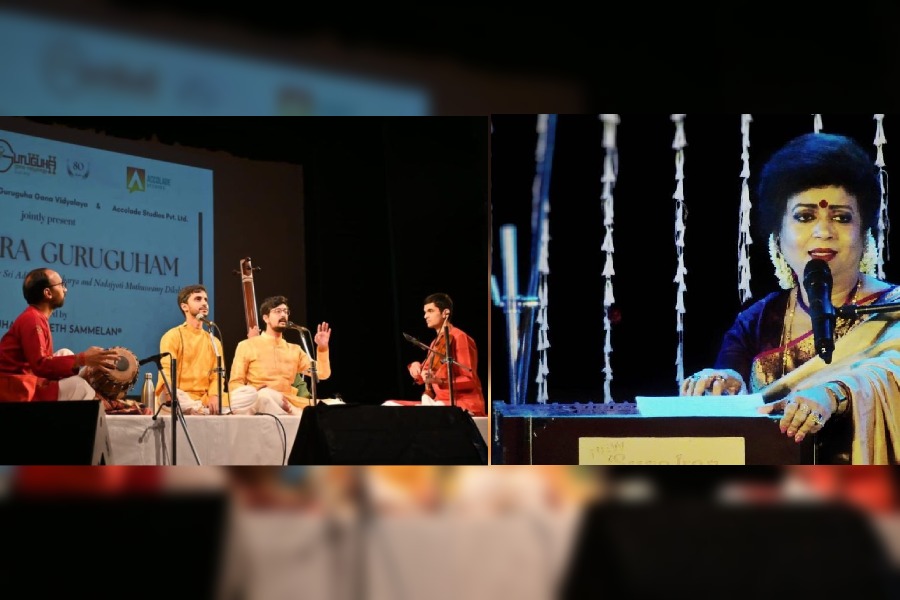Sri Guruguha Gana Vidyalaya celebrated the 248th jayanti of Nadajyoti Muthuswamy Dikshitar through a two-day music festival, which was divided into two different programmes. The first day witnessed Pravah, a confluence of Western and Carnatic classical music, showcasing 35 unique compositions by Dikshitar which are famous as nottuswaras. The nottuswaras are famous as an interaction between the East and the West. The compositions were the Sanskrit and the Carnatic versions of popular Scottish and Irish tunes — for instance, “Santatam pahimam” is influenced by the British national anthem, “God save the king”, “Kamalasana vandita” by Galopede numbers, “Vande Meenakshi” by “The rakes of mallow”, “Vara Shiva balam” by “Castilian maid” and “Dasharathe” by “Fanny power”.
The nottuswaras were performed by the young students of Sri Guruguha Gana Vidyalaya and the Western scores by members of the Calcutta Chamber Orchestra. The narration, written by Venkatraman Subramanian and directed by T.N. Champak, provided an insight into Dikshitar’s creations. The visuals, the renditions and able support by S. Venkatraman on the mridangam and Sagnik Sammadar on the keyboard added a unique dimension to the programme. The effort to explore a rare side of Carnatic music through Pravah was appreciable and won hearts owing to the artistic ebullience.
The programme on the second day was Shankara Guruguham, a thematic Carnatic concert bringing together Adi Shankaracharya and Muthuswamy Dikshitar. The evening was a perfect blend of vocals by Vivek Sadasivam as well as narration and visuals by Vinay Varanasi (picture, left). Adi Shankaracharya’s “Ganesha pancharatnam” on the violin was followed by Sadasivam’s rendition of “Panchamatanga” in Ragam Malahari. Sadasivam and Varanasi also performed a prayer for Shiva in Ragam Shankarabharanam, followed by slokas from Adi Shankaracharya’s “Ganga stotram”, which was complemented by Dikshitar’s “Gange mam pahi” in Raga Chenchurutti. In a powerful tribute to the goddess, Shakti, the song, “Akhilandeshwari”, in Raga Dwijavanti was also presented, alongside kritis for Krishna in Raga Brindavana Saranga.
Sadasivam rendered his focal piece, “Sri Bhargavi”, in Ragam Mangalakaishiki as Varanasi recounted the different facets of Adi Shankaracharya’s “Kanakadhara stotram”. Varanasi also prepared a live painting of Gajalakshmi with a kriti complementing him. The programme concluded with a medley of various kritis composed by Muthuswamy Dikshitar for worshipping Ganesha, Shiva, Vishnu, Shakti, Skanda and Surya. The duo was wonderfully supported by Vaibhav Ramani on the violin and Adamya Ramanand on the mridangam. The programme was a treat for the audience.
Bhavna presented a solo vocal recital by Chandrabali Rudra Dutta (picture, right) at Rabindra Sadan, where the artist portrayed the different sides of Rabindrasangeet. Rabindranath Tagore’s compositions are divided into segments and Dutta chose several from each segment to bring out the vastness of his musical oeuvre. Her renditions of songs from the various parjas, such as “Baje koruno sure”, “Sajani sajani Radhika lo”, “Jete jete ekla pathe” and “Basanti hey bhubanamohini”, left a mark. The second part of the programme consisted of puratoni songs, also known as bhanga gaan, numbers from the dance dramas, as well as compositions that have a Western influence.
Dutta was able to recreate the magic of these famous songs with her charming vocal abilities. Subrata Babu Mukherjeeon the keyboard, Biplab Mondal on the tabla, Prithibi Mukherjee on the octopad, Jhumu Mullick on bass guitar and Pallab on lead guitar accompanied the artist wonderfully.










